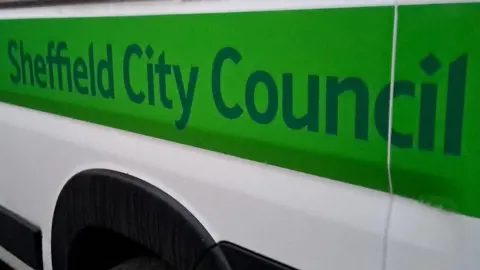Special needs transport costs go £7m over budget
 Sheffield City Council
Sheffield City CouncilSpending on school transport for children with special educational needs and disabilities (SEND) has cost Sheffield City Council an extra £7m on top of its expected budget.
Almost 2,480 SEND pupils use home to school transport in the city – about 1,000 more than pre-pandemic numbers - with the council now spending £22.7m to deliver the service.
Councils are required by law to provide free transport to under 16s with SEND who are unable to walk to school.
Sheffield City Council said it had consulted with families on how it could make savings, but one charity said any changes would create financial and emotional stress for families.
'Transport so important'
SEND transport costs are one of the council's biggest overspends.
Jane Wilby, assistant director of finance, told a council meeting: "The council has looked at using travel trainers to promote independence and a shift to personal travel budgets.
"A consultation on post-16 travel support has just concluded to ensure that young people are better prepared for adulthood and to reduce the burden on council costs."
The consultation suggested moving to personal travel budgets, which sees funding given directly to families so they can arrange travel instead of using taxis or minibuses provided by the council.
However, Sheffield Parent Carer Forum said the funding was not enough and some young people might be forced to travel independently before they were ready, causing safeguarding and road safety risks.
The charity said some parents might be forced to leave their jobs to take their children to school or families might feel forced to choose a less appropriate school because it was closer to home.
Eva Juusola, of the Forum, said: "It's not just about distance, it's also logistics – you simply cannot take your disabled child to their special school if you have to drop off their non-disabled sibling at the local primary school at the same time.
"Transport is such an important part of a child's life and if it goes wrong, it can really impact on their access to education.
"It's really important not to overload buses and taxis as that can lead to unacceptably long journey times and cause sensory overload for some children, meaning that by the time they arrive at school they are no longer in a state ready to learn."
The charity wants the council to save money by reviewing its commissioning arrangements with taxi companies.
The County Councils Network says there has been an increase in pupils eligible for Education, Health and Care Plans, which set out the level of support children can receive, including transport to school.
The number of students on these plans has more than doubled nationally from 240,000 in 2015 to 517,000 in 2023.
Listen to highlights from South Yorkshire on BBC Sounds, catch up with the latest episode of Look North or tell us a story you think we should be covering here.
